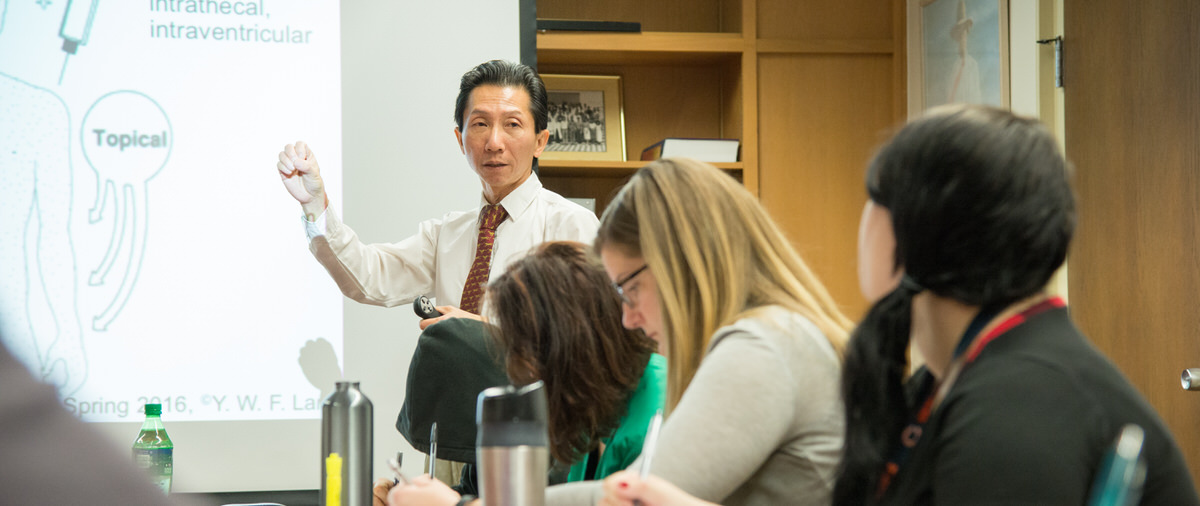

The Neuroscience discipline of the Integrated Biomedical Sciences program provides didactic and laboratory training in subject areas and levels of analysis ranging from molecular, cellular, and neurochemical to systems, behavioral, and clinical, all focused on the regulation and function of the nervous system. Drawing on the expertise of approximately fifty faculty from five basic science departments and eight affiliated departments or divisions within the medical and dental schools, we emphasize a flexible program of study and research tailored to the individual needs and interests of all students in Neuroscience.
In addition to discipline-specific fundamental and elective courses, we offer a rich diversity of research rotation opportunities, upper-level elective courses, and a broad selection of faculty dedicated to mentoring graduate students in dissertation research. Furthermore, Neuroscience students will enjoy a number of enrichment opportunities, including journal clubs, seminars, an annual retreat, participation in brain awareness week activities, and several social functions. Students are encouraged to present their research in a variety of settings, to attend professional meetings locally, nationally and even internationally, and to publish their work in peer-reviewed professional journals. A highly interactive community of faculty, post-doctoral fellows, laboratory staff and fellow students all contribute to a challenging, stimulating and supportive environment within which our students can develop into successful neuroscientists.
Scroll right for more
| Course Number | Title | Credit Hours |
|---|---|---|
| IBMS 5000 | Fundamentals of Biomedical Sciences | 8 |
| IBMS 5008 | Lab Rotations | 1-3 |
| TSCI 5070 | Responsible Conduct of Research | 2 |
| PHYL 5041 | Excitable Membranes | 1 |
| INTD 5040 | Fundamentals Of Neuroscience1: Molecular, Cellular, & Developmental Neuroscience | 2 |
| CSAT 5095 | Experimental Design and Data Analysis | 3 |
| INTD 5043 | Fundamentals Of Neuroscience2: Systems Neuroscience | 3 |
| INTD 5047 | Neuroanatomy | 2 |
| PHAR 5020 | Basics Of Research Design | 2 |
| PHAR 5092 | Special Problems in Pharmacology: Research Practicum | 1 |
| CSAT 6005 | Rigor & Reproducibility | 1 |
| IBMS 6090 | Seminar | 1.5 |
| IBMS 6097 | Research | 0.5-12 |
| IBMS 7001 | Qualifying Exam | 1 |
| IBMS 7010 | Student Journal Club and Research Presentation | 1-2 |
| IBMS 7099 | Dissertation | 1-12 |
Recommended Electives (any course at UTHSA may be taken as an elective)
Scroll right for more
| Course Number | Title | Credit Hours |
|---|---|---|
| PHAR 5013 | Principles Of Pharmacology & Physiology 1 | 3 |
| CSAT 6048 | Biology of Aging | 4 |
| INTD 6045 | Clinical Practicum In Neuroscience | 1 |
| PHAR 6027 | Fundamentals Of Neuroethics | 1 |
| PHAR 5091 | Special Topics: Microelectives | 0.5-9 |
| BIOC 6010 | Gene Expression and Omics | 2 |
| BIOC 6033 | Cell Signaling Mechanisms | 2 |
| BIOC 6035 | Drug Design And Discovery | 2 |
| CSAT 5025 | Genetics | 1 |
| CSAT 6059 | Stem Cells & Regenerative Medicine | 1 |
| INTD 7074 | Topics In Translational Medical Product Development | 1 |
| PHAR 6005 | Drugs in Society | 3 |
| PHAR 6025 | Molecular Pharmacology | 2 |
| PHYL 6091 | Selected Topics Of Physiology | 2 |
**A minimum of 2 semesters of IBMS 7099-7NS (Dissertation) is required for graduation. A student may begin enrolling in IBMS 7099-7NS once the Dissertation Research Proposal and the Dissertation Supervising Committee membership are approval by the GSBS Dean. Final hours (3.0 SCH) may be applicable for the final semester.